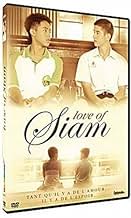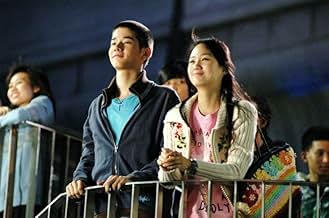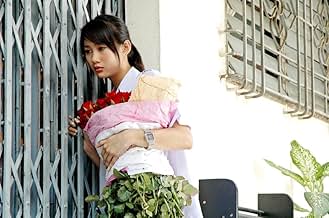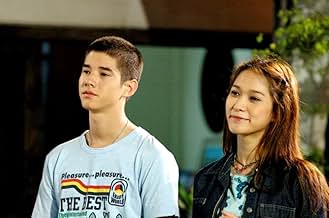NOTE IMDb
7,7/10
4,4 k
MA NOTE
Ajouter une intrigue dans votre langueTwo boyhood friends are separated due to the disappearance of the sister of one of them, then later meet again as teenagers, when one of them has become a pop singer, and they discover feeli... Tout lireTwo boyhood friends are separated due to the disappearance of the sister of one of them, then later meet again as teenagers, when one of them has become a pop singer, and they discover feelings that they did not know they had.Two boyhood friends are separated due to the disappearance of the sister of one of them, then later meet again as teenagers, when one of them has become a pop singer, and they discover feelings that they did not know they had.
- Réalisation
- Scénario
- Casting principal
- Récompenses
- 10 victoires et 16 nominations au total
Jirayu La-ongmanee
- Young Tong
- (as Jirayu Laongmanee)
Jarunee Boonsake
- Physical Education Teacher
- (as Charunee Boonsek)
Nattapong Arunnate
- Earth
- (as Natthaphong Aroonnet)
Avis à la une
I can see where the previous commentator came from. However, maybe biased by my own liking of mellow and subtle plot-weaving, I enjoyed the overall picture painted by the music, 2 main actors, and the parents and June.
I personally favor this movie because it doesn't construct/explain explicitly the events and personality surrounding each character as concrete context of the story, which is often a technique used by mainstream films to materialize climax and logic of a movie's plot (e.g. she acts/feels this way because it was established that she was such and such...).
Therefore I suppose the reason so many people like this movie literally across the globe (mainly observed on forums from the United States, Taiwan, Hong Kong, China, Philippines, and Europe), is because it uses a Thai case to exemplify humanity's constrained reaction toward its surrounding.
Without spoiling the movie, I am referring to the scenes the director ended up choosing as plot construction regarding characters' emotions and actions. Instead of picking the conventional expression that would usually indicate 'sad', 'she is going to blow up', and 'angry', the scenes selected to continue the flow and plot of the movie are rather life-like: Life doesn't always present significant events with significant background music and conventional cues, which often supports both the actors and audiences in moving the drama (or movie in this case) along.
So my friends and I love the movie for such illumination that: if the contemporary cultures often internalize certain procedures, cues, and embodiment that connect external events and internal reactions/feelings, what are humans to do in a real world that is not tamed by our rule?
Maybe from a more speculative audience's eye: what can we possibly do if we cannot bear to lose the one we love, and what if we go on life without loving anyone at all? The movie achieves a 9/10 for me despite its weak elements (some acting are definitely...not so great, but I don't speak Thai and don't know the culture), exactly because it constructs a unconventional platform (the acting, climax-devices, the music, and plot) and operates consistently along its story-telling (a gradually broadening perspective of love across generation (Mew-grandmother), time/space (Tong's family & sister), gender (Mew & Tong), and the peripheral Others (the Chinese-Thai Ying and her crush on Mew, and the Catholic family)).
I personally favor this movie because it doesn't construct/explain explicitly the events and personality surrounding each character as concrete context of the story, which is often a technique used by mainstream films to materialize climax and logic of a movie's plot (e.g. she acts/feels this way because it was established that she was such and such...).
Therefore I suppose the reason so many people like this movie literally across the globe (mainly observed on forums from the United States, Taiwan, Hong Kong, China, Philippines, and Europe), is because it uses a Thai case to exemplify humanity's constrained reaction toward its surrounding.
Without spoiling the movie, I am referring to the scenes the director ended up choosing as plot construction regarding characters' emotions and actions. Instead of picking the conventional expression that would usually indicate 'sad', 'she is going to blow up', and 'angry', the scenes selected to continue the flow and plot of the movie are rather life-like: Life doesn't always present significant events with significant background music and conventional cues, which often supports both the actors and audiences in moving the drama (or movie in this case) along.
So my friends and I love the movie for such illumination that: if the contemporary cultures often internalize certain procedures, cues, and embodiment that connect external events and internal reactions/feelings, what are humans to do in a real world that is not tamed by our rule?
Maybe from a more speculative audience's eye: what can we possibly do if we cannot bear to lose the one we love, and what if we go on life without loving anyone at all? The movie achieves a 9/10 for me despite its weak elements (some acting are definitely...not so great, but I don't speak Thai and don't know the culture), exactly because it constructs a unconventional platform (the acting, climax-devices, the music, and plot) and operates consistently along its story-telling (a gradually broadening perspective of love across generation (Mew-grandmother), time/space (Tong's family & sister), gender (Mew & Tong), and the peripheral Others (the Chinese-Thai Ying and her crush on Mew, and the Catholic family)).
I watched 'Rak haeng Siam' a week ago. And I love this movie!
Despite the recent controversy about gay issues in Thailand, this movie is not focused only on gay romances, but love in general.
In the movie, we witness various types of people's relationships and the acts of love they do to each other, whether they are of mother and son, brother and sister, grandmother and grandson, husband and wife, or the love among friends.
'As long as there's love, there's hope'. This sentence is from one of the film's theme songs (which are mostly written by the director-writer himself), and it exactly presents the tone of the movie: heartwarming and hopeful.
While being promoted as a movie about love, 'Rak haeng Siam' is also one of the best family and coming of age movies ever made. We can see how the characters have to cope with their past losses, and how they overcome their grief. The teenagers have found who they really are, what they want, and go on with their lives. These serious topics are delicately presented, thanks to the director who brilliantly helms the movie.
All the main cast are at their best, especially veteran Sinjai Plengpanit, as a woman who's desperate to save her family from being torn apart. Her performance is heartbreaking. Another praise for newcomers Witwisit Hirunwongkul and Mario Maurer, who play the major teenage roles. They are so into the characters we could believe this is real.
'Rak haeng Siam' is indeed a good film as many have said. It tells us even though our love is unanswered, we can still learn from it, and we should be grateful that, at least, we are once capable of loving.
Despite the recent controversy about gay issues in Thailand, this movie is not focused only on gay romances, but love in general.
In the movie, we witness various types of people's relationships and the acts of love they do to each other, whether they are of mother and son, brother and sister, grandmother and grandson, husband and wife, or the love among friends.
'As long as there's love, there's hope'. This sentence is from one of the film's theme songs (which are mostly written by the director-writer himself), and it exactly presents the tone of the movie: heartwarming and hopeful.
While being promoted as a movie about love, 'Rak haeng Siam' is also one of the best family and coming of age movies ever made. We can see how the characters have to cope with their past losses, and how they overcome their grief. The teenagers have found who they really are, what they want, and go on with their lives. These serious topics are delicately presented, thanks to the director who brilliantly helms the movie.
All the main cast are at their best, especially veteran Sinjai Plengpanit, as a woman who's desperate to save her family from being torn apart. Her performance is heartbreaking. Another praise for newcomers Witwisit Hirunwongkul and Mario Maurer, who play the major teenage roles. They are so into the characters we could believe this is real.
'Rak haeng Siam' is indeed a good film as many have said. It tells us even though our love is unanswered, we can still learn from it, and we should be grateful that, at least, we are once capable of loving.
Just some general commentary as a U.S. viewer watching this movie: It's beautifully directed. I can't comment much on the writing, but as a gay viewer in particular, I really appreciate that the script interweaves two stories: coming out and the coherence of family in a time of grief. The reason I appreciate this is that, even in the U.S., when movies deal with homosexuality, it is generally treated as a singular issue that is separate and distinct from all others. In reality it is one part of the fabric of family and love that comprises everyone's life. Without this key insight, I think the movie would deal with the issue in too patronizing or shallow a manner, as many gay-themed movies do.
Prior to watching I was acutely aware of the commentary that the movie is overlong and not focused enough. There is some truth to this; it is a very long movie for its subject matter. But I think the movie's main strength is in its characters and central subject matter. With too much editing, I could easily see how the core of the movie would be lost. For me personally I was glad the director erred in favor of too much immersion in the interplay between his characters.
As to acting -- clearly I don't speak or understand Thai. But I think some things are universal, like the mother's strength and resolve in times of crisis. And of course Mew's smile. The connection is there.
I loved the movie and I hope it finds its way to broader distribution. If nothing else, the soundtrack should -- it's truly great.
Cheers!
Prior to watching I was acutely aware of the commentary that the movie is overlong and not focused enough. There is some truth to this; it is a very long movie for its subject matter. But I think the movie's main strength is in its characters and central subject matter. With too much editing, I could easily see how the core of the movie would be lost. For me personally I was glad the director erred in favor of too much immersion in the interplay between his characters.
As to acting -- clearly I don't speak or understand Thai. But I think some things are universal, like the mother's strength and resolve in times of crisis. And of course Mew's smile. The connection is there.
I loved the movie and I hope it finds its way to broader distribution. If nothing else, the soundtrack should -- it's truly great.
Cheers!
Much have been raved about Matthew Chukiat Sakveerakul's The Love of Siam, and thankfully I had managed to catch this on screen after it's been playing for some time over here on only one screen. Sakveerakul is perhaps more famous here for his thriller 13 Beloved (renamed 13: Game of Death here), but through this film had demonstrated he's equally adept at telling a romance and family drama.
The prologue for the film is somewhat extended, setting the stage for the lead characters. We have Mew (Witwisit Hiranyawongjul) who spends his childhood with his grandmother (Pimpan Buranapim), whose neighbours are a tight knit Catholic family headed by dad Korn (Songsit Roongniphakunsri), domineering mother Sunee (Sinraj Plengpanit), and children Tong (Mario Maurer) and Tang (Laila Boonyasak). A hiking trip resulted in the disappearance of Tang, and the grieving family moves away, temporarily grinding the friendship of the two boys Mew and Tong, to a halt.
Fast forward to today, Mew is now the brains and lead singer behind his huge boy band August, and is being courted by neighbour Ying (Kanya Rattapetch). Tong too faces girlfriend woes, where the school flower and spoilt brat Donut (Aticha Pongsilpipat, in a rather needless role here compared to Rattapetch's) faces a nonchalant Tong and draws an ultimatum of sorts. Sparks fly when the two boys reunite by chance on the streets, sparking into motion a series of events that would inevitably lead to a homosexual romance.
While it's easy to fall into a gimmicky promotional angle using the love between Tong and Mew, this film offered a lot more, especially that between Tong's family members. The missing Tang had caused Korn to become an insufferable alcoholic, while the mother stoically holds the family together, and the last thing she expects is for Tong to develop a liking for Mew. This segment of the story kicked into melodramatic overdrive when mom Sunee, with the help of the boys, convinces their friend June (also played by Laila Boonyasak), a dead ringer for her child, to pose as Tang and to snap Korn out of his depression.
Sakveerakul managed to weave into the narrative the different kinds of love all into one film - the unrequited, first crushes, first love, unconditional ones as given by parents to child, even stand-by-mes encouragement, support as seen by the members of August, and of course, bromance. With the family angle, there's the theme of coming to terms, and learning to let go, which I felt was the richer of the two main threads running through the narrative.
It's a beautiful film, not only because having a bevy of pretty looking cast members helped, but also because it had a wonderful looking set of production sets and values, and while I have to rely on the subtitles to understand the song lyrics, the melodies here are simply marvelous. Korea and Japan had to watch out, because Sakveerakul has shown that Thailand is fast catching up in making heartfelt, coming of age romances that would tug at your heartstrings.
What's more interesting here is that the film is rated M18, without a cut detected, and even more so, the kissing scenes between Mew and Tong were left intact. Many years ago, there would be a straight out censorship snip at the scene to the cutting room floor, and in more recent times, a scene like this would be shortened and slapped with an R21 rating. An M18 rating for this seemed to point to a relaxation of the rules, though A Frozen Flower had demonstrated that sex between men are still snipped and slapped with an R21 rating.
The prologue for the film is somewhat extended, setting the stage for the lead characters. We have Mew (Witwisit Hiranyawongjul) who spends his childhood with his grandmother (Pimpan Buranapim), whose neighbours are a tight knit Catholic family headed by dad Korn (Songsit Roongniphakunsri), domineering mother Sunee (Sinraj Plengpanit), and children Tong (Mario Maurer) and Tang (Laila Boonyasak). A hiking trip resulted in the disappearance of Tang, and the grieving family moves away, temporarily grinding the friendship of the two boys Mew and Tong, to a halt.
Fast forward to today, Mew is now the brains and lead singer behind his huge boy band August, and is being courted by neighbour Ying (Kanya Rattapetch). Tong too faces girlfriend woes, where the school flower and spoilt brat Donut (Aticha Pongsilpipat, in a rather needless role here compared to Rattapetch's) faces a nonchalant Tong and draws an ultimatum of sorts. Sparks fly when the two boys reunite by chance on the streets, sparking into motion a series of events that would inevitably lead to a homosexual romance.
While it's easy to fall into a gimmicky promotional angle using the love between Tong and Mew, this film offered a lot more, especially that between Tong's family members. The missing Tang had caused Korn to become an insufferable alcoholic, while the mother stoically holds the family together, and the last thing she expects is for Tong to develop a liking for Mew. This segment of the story kicked into melodramatic overdrive when mom Sunee, with the help of the boys, convinces their friend June (also played by Laila Boonyasak), a dead ringer for her child, to pose as Tang and to snap Korn out of his depression.
Sakveerakul managed to weave into the narrative the different kinds of love all into one film - the unrequited, first crushes, first love, unconditional ones as given by parents to child, even stand-by-mes encouragement, support as seen by the members of August, and of course, bromance. With the family angle, there's the theme of coming to terms, and learning to let go, which I felt was the richer of the two main threads running through the narrative.
It's a beautiful film, not only because having a bevy of pretty looking cast members helped, but also because it had a wonderful looking set of production sets and values, and while I have to rely on the subtitles to understand the song lyrics, the melodies here are simply marvelous. Korea and Japan had to watch out, because Sakveerakul has shown that Thailand is fast catching up in making heartfelt, coming of age romances that would tug at your heartstrings.
What's more interesting here is that the film is rated M18, without a cut detected, and even more so, the kissing scenes between Mew and Tong were left intact. Many years ago, there would be a straight out censorship snip at the scene to the cutting room floor, and in more recent times, a scene like this would be shortened and slapped with an R21 rating. An M18 rating for this seemed to point to a relaxation of the rules, though A Frozen Flower had demonstrated that sex between men are still snipped and slapped with an R21 rating.
I enjoyed tremendously this coming-of-age Thai film.
It could easily hit the world market if it is wisely edited: 2 hours and 10 minutes is too much for a non-Thai public; the story drags for too long. The script tries to touch some issues that derive the plot from its center. Some scenes are too slow and even reiterative. The casting is good enough as the two boys are cute and the rest of the cast fit their roles with different success. The acting is very credible for the two main characters and also the mother of Tong and the granny of Mew, not that much for the others. The music is an important feature in this film and it is very nice. The placing and moving of the camera is very fresh and helps to enhance the situations. Lighting and photography are good enough. I wish the best to this film and its director.
It could easily hit the world market if it is wisely edited: 2 hours and 10 minutes is too much for a non-Thai public; the story drags for too long. The script tries to touch some issues that derive the plot from its center. Some scenes are too slow and even reiterative. The casting is good enough as the two boys are cute and the rest of the cast fit their roles with different success. The acting is very credible for the two main characters and also the mother of Tong and the granny of Mew, not that much for the others. The music is an important feature in this film and it is very nice. The placing and moving of the camera is very fresh and helps to enhance the situations. Lighting and photography are good enough. I wish the best to this film and its director.
Le saviez-vous
- AnecdotesThailand's 2009 Academy Awards official submission to Foreign-Language Film category.
- Versions alternativesThe Director's Cut of the movie has a running time of 178 minutes.
Meilleurs choix
Connectez-vous pour évaluer et suivre la liste de favoris afin de recevoir des recommandations personnalisées
- How long is Love of Siam?Alimenté par Alexa
Détails
- Date de sortie
- Pays d’origine
- Sites officiels
- Langue
- Aussi connu sous le nom de
- Love of Siam
- Lieux de tournage
- Sociétés de production
- Voir plus de crédits d'entreprise sur IMDbPro
Box-office
- Montant brut mondial
- 1 405 711 $US
- Durée2 heures 58 minutes
- Couleur
- Mixage
- Rapport de forme
- 1.85 : 1
Contribuer à cette page
Suggérer une modification ou ajouter du contenu manquant

Lacune principale
By what name was Rak haeng Siam (2007) officially released in India in English?
Répondre






















